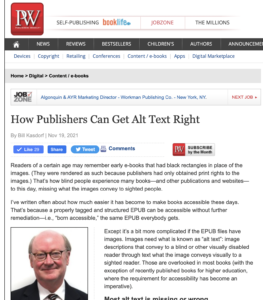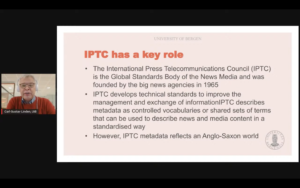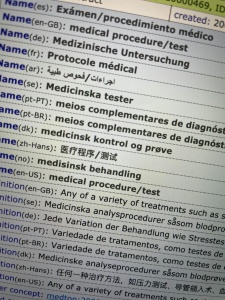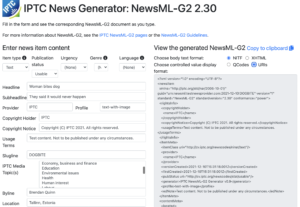Categories
Archives
The IPTC NewsCodes Working Group has now released the Q4 update to Media Topics, IPTC’s subject taxonomy used for classifying news content.
The main changes were made to the religion branch as part of our regular review cycle, and to sport events after discussing the terms with the Sports Content Working Group. This means that we have retired 29 terms and added 15 others. So in total we currently have 1,159 active terms in the vocabulary.
All new terms were created in en-GB and en-US versions, and have translations in Norwegian thanks to NTB. Other language translations will be added as they are contributed.
Below is a list of all of the changes.
New terms:
- medtop:20001338 education policy
- medtop:20001339 wellness
- medtop:20001340 mental wellbeing
- medtop:20001341 regular competition
- medtop:20001342 playoff championship
- medtop:20001343 final game
- medtop:20001344 Catholicism
- medtop:20001345 bar and bat mitzvah
- medtop:20001346 canonisation
- medtop:20001347 Shia Islam
- medtop:20001348 Sunni Islam
- medtop:20001349 atheism and agnosticism
- medtop:20001350 Eid al-Adha
- medtop:20001351 Hasidism
- medtop:20001352 Hanukkah
Retired terms:
- medtop:20000660 ecumenism
- medtop:20000662 Old Catholic
- medtop:20000665 Anglican
- medtop:20000666 Baptist
- medtop:20000667 Lutheran
- medtop:20000668 Mennonite
- medtop:20000669 Methodist
- medtop:20000670 Reformed
- medtop:20000671 Roman Catholic
- medtop:20000672 concordat
- medtop:20000675 Freemasonry
- medtop:20000687 interreligious dialogue
- medtop:20000689 religious event
- medtop:20000701 temple
- medtop:20001109 continental championship
- medtop:20001110 continental cup
- medtop:20001111 continental games
- medtop:20001112 international championship
- medtop:20001113 international cup
- medtop:20001114 international games
- medtop:20001115 national championship
- medtop:20001116 national cup
- medtop:20001117 national games
- medtop:20001118 regional championship
- medtop:20001119 regional cup
- medtop:20001120 regional games
- medtop:20001121 world championship
- medtop:20001122 world cup
- medtop:20001123 world games
Label changes:
- medtop:12000000 religion and belief -> religion
- medtop:20000128 international court or tribunal -> international court and tribunal
- medtop:20000423 environmental politics -> environmental policy
- medtop:20000458 mental health and disorders -> mental health
- medtop:20000657 religious belief -> belief systems
- medtop:20000661 Mormon -> Mormonism
- medtop:20000663 Orthodoxy -> Christian Orthodoxy
- medtop:20000664 Protestant -> Protestantism
- medtop:20000674 cult and sect -> cult
- medtop:20000690 religious festival or holiday -> religious festival and holiday
- medtop:20000697 religious facilities -> religious facility
- medtop:20000702 religious institutions and state relations -> relations between religion and government
Definition changes:
- medtop:12000000 religion
- medtop:20000117 arbitration and mediation
- medtop:20000423 environmental policy
- medtop:20000657 belief systems
- medtop:20000658 Buddhism
- medtop:20000659 Christianity
- medtop:20000661 Mormonism
- medtop:20000664 Protestantism
- medtop:20000673 Confucianism
- medtop:20000674 cult
- medtop:20000676 Hinduism
- medtop:20000677 Islam
- medtop:20000678 Jainism
- medtop:20000679 Judaism
- medtop:20000680 nature religion
- medtop:20000681 Zoroastrianism
- medtop:20000682 Scientology
- medtop:20000683 Shintoism
- medtop:20000684 Sikhism
- medtop:20000685 Taoism
- medtop:20000686 Unificationism
- medtop:20000690 religious festival and holiday
- medtop:20000691 Christmas
- medtop:20000692 Easter
- medtop:20000693 Pentecost
- medtop:20000694 Ramadan
- medtop:20000695 Yom Kippur
- medtop:20000696 religious ritual
- medtop:20000697 religious facility
- medtop:20000698 church
- medtop:20000699 mosque
- medtop:20000700 synagogue
- medtop:20000702 relations between religion and government
- medtop:20000704 pope
- medtop:20000705 religious text
- medtop:20000706 Bible
- medtop:20000708 Torah
- medtop:20001271 All Saints Day
- medtop:20001273 baptism
Hierarchy moves:
- medtop:20000423 environmental policy moved from medtop:06000000 environment to medtop:20000621 government policy
- medtop:20000479 healthcare policy moved from medtop:07000000 health to medtop:20000621 government policy
- medtop:20000480 government health care moved from medtop:20000479 healthcare policy to medtop:07000000 health
- medtop:20000483 health insurance moved from medtop:20000479 healthcare policy to medtop:07000000 health
- medtop:20000690 religious festival and holiday moved from medtop:20000689 religious event to medtop:12000000 religion
- medtop:20000696 religious ritual moved from medtop:20000689 religious event to medtop:12000000 religion
- medtop:20001177 Olympic Games moved from medtop:20001123 world gamesto medtop:20001108 sport event
- medtop:20001178 Paralympic Games moved from medtop:20001123 world games to medtop:20001108 sport event
- medtop:20001239 exercise and fitness moved from medtop:10000000 lifestyle and leisure to medtop:20001339 wellness
- medtop:20001293 streaming service moved from medtop:20000045 mass media to medtop:20000304 media
As always, the Media Topics vocabularies can be viewed in the following ways:
- In a collapsible tree view
- As a downloadable Excel spreadsheet
- On one page on the cv.iptc.org server
- In machine readable formats such as RDF/XML and Turtle using the SKOS vocabulary format: see the cv.iptc.org guidelines document for more detail.
For more information on IPTC NewsCodes in general, please see the IPTC NewsCodes Guidelines.
At the recent IPTC Standards Committee Meeting, NewsML-G2 version 2.30 was approved.
The full NewsML-G2 XML Schema, NewsML-G2 Guidelines document and NewsML-G2 specification document have all now been updated.
The biggest change (Change Request CR00211) is that <catalogRef/> and <catalog/> elements are now optional. This is so that users who choose to use full URIs instead of QCodes do not need to include an unnecessary element.
The other user-facing change is CR00212 which adds residrefformat and residrefformaturi attributes to the targetResourceAttributes attribute group, used in <link>, <icon> and <remoteContent>.
Other changes CR00213 and CR00214 aren’t visible to end users and don’t change any functionality, but make the XML Schema easier to read and maintain.
- The top-level folder of the NewsML-G2 v2.30 release is http://iptc.org/std/NewsML-G2/2.30/.
- The NewsML-G2 Implementation Guidelines document, updated to cover version 2.30 is available at https://www.iptc.org/std/NewsML-G2/guidelines
- The latest NewsML-G2 Specification document is available at https://www.iptc.org/std/NewsML-G2/specification/
- The XML Schema for NewsML-G2 v2.30 is at http://iptc.org/std/NewsML-G2/2.30/specification/NewsML-G2_2.30-spec-All-Power.xsd
XML Schema documentation of version 2.30 version is available on GitHub and at http://iptc.org/std/NewsML-G2/2.30/specification/XML-Schema-Doc-Power/.
NewsML-G2 Generator updated
The NewsML-G2 Generator has been updated to use version 2.30. This means that catalogRef is only included if QCode mode is chosen. The Generator also uses the new layout which means that the target document is updated in real time as the form is completed.
To follow our work on GitHub, please see the IPTC NewsML-G2 GitHub repository.
The full NewsML-G2 change log showing the Change Requests included in each new version is available at the dev.iptc.org site.

Bill Kasdorf, IPTC Individual Member, has written about IPTC Photo Metadata in his latest column for Publishers Weekly.
In the article, a double-page spread in the printed version of the 11/22/2021 issue of Publishers Weekly and an extended article online, Bill references Caroline Desrosiers of IPTC Startup member Scribely saying “if publications are born accessible, then their images should be born accessible, as well.”
The article describes how the new Alt Text (Accessibility) and Extended Description (Accessibility) properties in IPTC Photo Metadata can be used to make EPUBs more accessible.
Bill goes on to provide an example, supplied by Caroline Desrosiers, of how an image’s caption, alt text and extended description fulfil very different purposes, and mentions that it’s perfectly fine to leave alt text blank in some cases! For more details, read the article here.

“Metadata is the wheel in the digital business model,” according to Carl-Gustav Linden of University of Bergen in Norway. “We can use it to combine the right content with the right readers, listeners and viewers. That’s why metadata is so essential.”
Professor Linden was speaking at the JournalismAI Festival taking place this week, hosted by the Polis think-tank at the London School of Economics and Political Science. The JournalismAI project is a collaboration between POLIS and newsrooms and institutes around the world, funded by the Google News Initiative.
We are very happy to see several mentions of IPTC standards and IPTC members, particularly the New York Times and iMatrics. The New York Times is seen as a forerunner in content classification, with Jennifer Parrucci (lead of the IPTC NewsCodes Working Group) giving presentations recently about their work. iMatrics supplies an automated content classification system based on IPTC Media Topics which can be used as part of editorial workflows.
One thing we would like to note is that Professor Linden mentions that the IPTC vocabularies are influenced by our background in US-based news organisations, citing an example of the schools terms being focussed on the US system. We are happy to say that in a recent update to IPTC Media Topics we clarified our terms around school systems, making the label names and descriptions much more generic and based on the international schools classifications.
This change was the result of many IPTC member organisations working together from different parts of the world, including Scandinavia, to come to a result that hopefully works for everyone (and of course, each user of Media Topics is welcome to extend the vocabulary for their own purposes if necessary). This is an example of the great work that takes place when our members work together.
The JournalismAI festival continues until Friday this week. All sessions from the festival are available on YouTube.
Thanks again to Polis and the JournalismAI team for giving us a mention!

